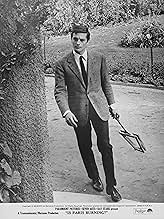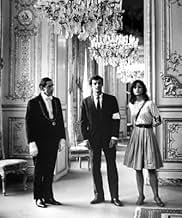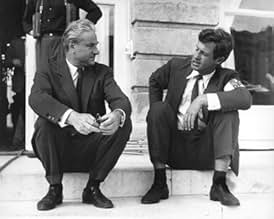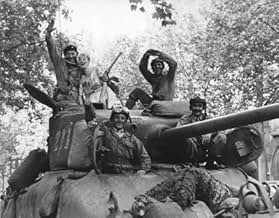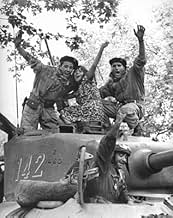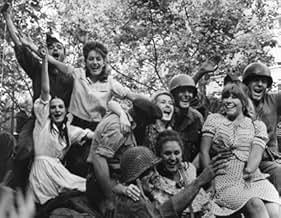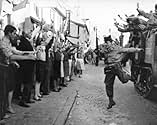August 1944. The Allies are approaching Paris and resistance groups within the city start to plan an uprising against the Germans. However, Hitler wants the city destroyed if it looks like t... Read allAugust 1944. The Allies are approaching Paris and resistance groups within the city start to plan an uprising against the Germans. However, Hitler wants the city destroyed if it looks like the Allies will take it.August 1944. The Allies are approaching Paris and resistance groups within the city start to plan an uprising against the Germans. However, Hitler wants the city destroyed if it looks like the Allies will take it.
- Nominated for 2 Oscars
- 4 nominations total
- GI in Tank
- (as Georges Chakiris)
- General Dietrich von Choltitz
- (as Gert Froebe)
Featured reviews
Fast forward to 1944. Maybe militarily Paris wasn't worth that much in defeating Hitler, but for the morale of a people being liberated from a brutal conqueror it was invaluable. When the forces of the Resistance in its many branches could no longer be contained with Allied armies only days from Paris, battle plans got changed and a Free French Division under General Phillippe Leclerc went in and helped the Resistance take the city.
Paris brule-t-il is the French cinema's answer to The Longest Day. It is dotted with cameos from French, German, and American film players and makes very effective use of newsreel footage blended into the finished product. You really do think you are watching an actual filmed record of the events as they happened.
The lead in this film is German actor Gert Frobe, better known to audiences as James Bond nemesis Goldfinger. The film opens with him being given command of the city by Hitler himself and given very specific orders to destroy the city before it was recaptured.
Frobe knows it and finally admits that the war is lost. He's concerned about what history will think of him should he do this terrible thing. He gets a direct order from Hannes Messemer playing Alfred Jodl and a reminder of what Hitler does to those who disobey him. Frobe's character General Von Choltitz died shortly after this film debuted and Jodl was executed after being tried at Nuremberg.
Jean-Paul Belmondo, Alain Delon, Jean-Pierre Cassel, Yves Montand are all playing roles of Resistance members. Leslie Caron has a poignant small part as a woman trying unsuccessfully to get her husband freed before the Nazis ship him off to Germany before retreating.
Americans in this film are Kirk Douglas as General Patton, Glenn Ford, as General Bradley and Robert Stack as General Siebert. Those three were put in briefly to insure some American box office in a French story. Funny no one thought of Douglas for the Patton biographical film classic four years later.
Orson Welles has a much bigger part as the Swedish consul general in Paris who negotiates between the Nazis and the Resistance before the Free French Division arrives. Another one of those brilliantly executed parts by Welles he did to get money for his own projects.
Director Rene Clement really made the people of Paris the star of this film. It is their tribute picture and a terrible reminder to people in every nation what it is like to live under a tyranny.
This is a spectacular pseudo-documentary style developing the liberation of Paris with the Resistance factions and tryings to burn the city by Nazy hierarchy . It's a co-production French and Paramount US with a plethora of international actors, many of them playing cameos and prestigious intervention. Special mention to Bruno Cremer as Resistance chief , Orson Welles as Sweden consul and Leslie Caron as fighter wishing to free her husband. The short details-characters about Resistance leaders only for a minutes are based on the stories of real-life people. Appear historical characters well incarnated by famous players Omar Bradley(Glenn Ford),George Patton(Kirk Douglas) General Lecrec(Claude Rich), Von Choltitz(Get Froebe), among others. The title movie comes from the continuous phone calls realized by Hitler to Von Choltitz that always began with : It's Paris burning ?. The movie was filmed in atmospheric black and white which allow the edition adding actual-life footage but also the main reason was the German swastikas flags but the French Mayor rejected to let the black and red in Paris and they would agree sole to gray and black version of flag that looked real when shot.
The motion picture displays an interesting script by Gore Vidal and Francis Ford Coppola, based on Larry Collins and Dominic Pierre novel who give you a much better perspective about role each Resistance faction played in the Paris liberation. The picture was deservedly nominated to Academy Award for best Art Direction, and best cinematography by Marcel Grignon, though didn't achieve none. The movie is professionally directed by Rene Clement, though sometimes is confuse and contains some flaws.
The little vignettes you see with characters appearing in the film for only a few minutes are all true. Unfortunately, they don't always make sense to an uninformed viewer and they give the viewer the sense of a badly edited film.
The true story of the last few days before the liberation is extremely remarkable. Hitler sent a hard core general he trusted to destroy Paris. It is incredible that he disobeyed orders and saved the city.
What I really loved about the movie was the city itself. It is one of the most beautiful cities in the world. The film was shot mostly in the actual locations where the events portrayed took place. As a lover of history, I have been fortunate to have visited Paris more than once and walked these locations fully aware of what happened there. That makes this movie special for me. But, the film does have problems.
Besides being a bit disjointed, the French and German dialog were dubbed in English. It would have been better with subtitles, although many of the same actors did their own English dubbing. The film is in black and white, which doesn't bother me, but it might have been better in color. One of the main reasons for B&W was the Nazi flags. The French authorities refused to allow red and black Nazi flags to fly in Paris, even for a movie. They agreed only to have black and gray flags. But the black and white filming also allowed the blending of authentic war footage with the movie. Also remember that another similar film, The Longest Day, was shot a couple of years earlier in B&W.
The film is filled with a small army of great international actors. That was fun, although I didn't buy Kirk Douglas as General Patton. Gert Frobe (Goldfinger) was excellent as the German general in charge of Paris and Charles Boyer was also excellent in his small role. The music was composed by Maurice Jarre and is just wonderful. Whenever I am in Paris, the music continually runs through my head. As a side note, Jarre obviously borrowed much of this soundtrack for use in "Grand Prix".
In short, this is a historical movie rather than a great film. I recommend you read the book to get the full impact of the movie. But understand this remarkable story of the liberation is stranger than fiction, which makes it a good read. And, if you ever visit Paris the movie will take on a whole new perspective.
Did you know
- TriviaOne of the main reasons for the movie being filmed in black and white: the French authorities refused to allow red and black Nazi flags to fly in Paris, even for a movie. They agreed only to the use of black and gray Nazi flags.
- GoofsJudging by Choltitz's own memoirs ('Soldat enter Soldaten", 1951) there never was an order to deliberately destroy Paris or its monuments. The orders concerned laming industrial plants, blowing bridges, crushing uprisings, and defending the town as a fortress, accepting collateral damage. Choltitz later found out these orders were addressed to his superiors, not to him. He does mention Hitler asking "Is Paris burning?" but says he was informed of this by others, whose names he does not give.
- Quotes
Lieutenant Henri Karcher: [over the phone to his father] Hello, Papa? This is Lieutenant Karcher. Your son. In spite of your pessimstic view of my military career, I'd like to announce I've just made some prisoners of the general in command of Paris at the Hotel Meurice. He surrendered to me. But I'm still very bad at drill.
- Crazy creditsThe end credit sequence is in color.
- ConnectionsFeatured in Magician: The Astonishing Life and Work of Orson Welles (2014)
- How long is Is Paris Burning??Powered by Alexa
Details
- Runtime
- 2h 53m(173 min)
- Color
- Aspect ratio
- 2.35 : 1

![Watch Bande-annonce [OV]](https://m.media-amazon.com/images/M/MV5BOWYyYzkwZTEtOTI4YS00NzFjLWI0ZmYtM2E1N2RiYTk2ZmNkXkEyXkFqcGdeQXRyYW5zY29kZS13b3JrZmxvdw@@._V1_QL75_UX500_CR0)
